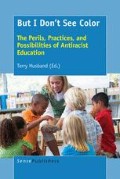Abstract
In diverse and migrant societies, uncertainty of others is common and inevitable. This uncertainty is most evident in the classroom between teachers and multiethnic students. As a result, cultural uncertainty and naïve understanding between students and teachers is detrimental to academic success in multicultural classrooms across the globe.
Access this chapter
Tax calculation will be finalised at checkout
Purchases are for personal use only
Preview
Unable to display preview. Download preview PDF.
References
Ang, R., Chong, W., Haun, V., Quek, C., & Yeo, L. (2008). Teacher-student relationships inventory: Testing for invariance across upper elementary and junior high samples. Journal of Psychoeducational Assessment, 26(4), 339–349.
Berger, C. R. (1986). Uncertain outcome values in predicted relationships: Uncertainty reduction theory then and now. Human Communication Research, 13, 34–38.
Berger, C. R., & Calabrese, R. J. (1975). Some explorations in initial interaction and beyond: Toward a developmental theory of interpersonal communication. Human Communication Research, 1, 99–112.
Dawkins, M. A. (2010). How it’s done: Using Hitch as a guide to uncertainty reduction theory. Communication Teacher, 24(3), 136–141.
Hamre, B. K., & Pianta, R. C. (2001). Early teacher-child relationships and the trajectory of children’s school outcomes through eighth grade. Child Development, 72, 625–638.
Pianta, R. C. (1999). Enhancing relationships between children and teachers. Washington, DC: American Psychological Association.
Redding, S. (2008). How parents and teachers view their school communities. Marriage & Family Review, 43(3/4), 269–288.
Editor information
Editors and Affiliations
Rights and permissions
Copyright information
© 2016 Sense Publishers
About this chapter
Cite this chapter
Hancock, S. (2016). Constructing Positive Anti-Racist Academic Relationships. In: Husband, T. (eds) But I Don’t See Color. SensePublishers, Rotterdam. https://doi.org/10.1007/978-94-6300-585-2_2
Download citation
DOI: https://doi.org/10.1007/978-94-6300-585-2_2
Publisher Name: SensePublishers, Rotterdam
Online ISBN: 978-94-6300-585-2
eBook Packages: EducationEducation (R0)

